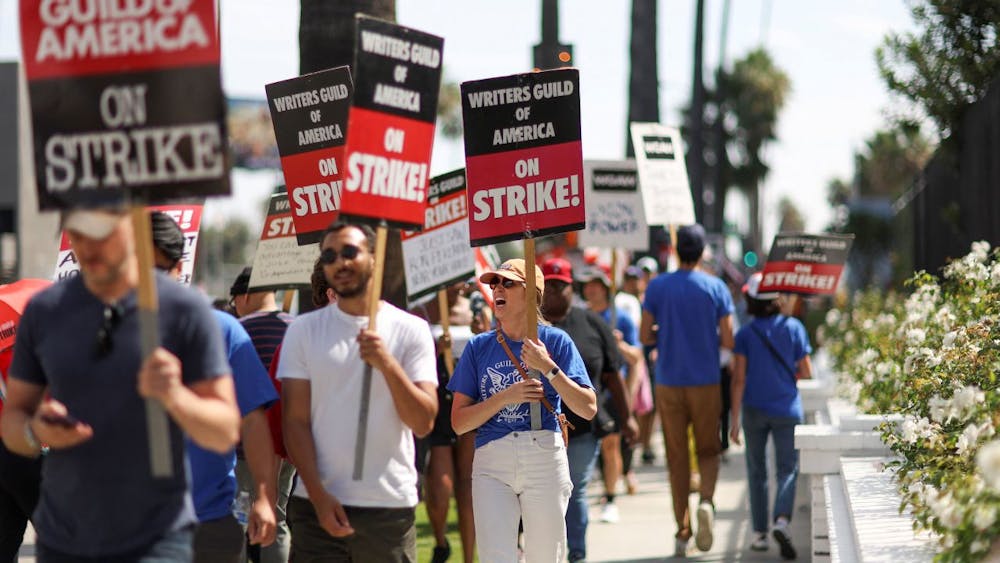On May 2nd, more than 11,000 members of the Writers Guild of America (WGA) set out to go on strike for the first time since 2007. This brought an immediate halt to many movies and television shows such as Saturday Night Live, or other popular Late Nights shows (Jimmy Kimmel, Stephen Colbert). For years, the strike had been brewing due to unfair pay and a recent rise of streaming and AI technology. However, 146 days later, on September 24th, the studio and writers reached a tentative agreement, ending the strike.
The strike began in May with extensive writers' demands, mainly surrounding better residuals, protection in the industry and higher payment. 99% of the Writers Guild had voted for increased compensation in their work; in comparison to other roles in the industry, writers don’t get the income they deserve for the work they do.
A demand regarding mandatory staffing and duration of employment would require a company to staff a show with a certain number of writers for a specified period of time; whether or not the writers were needed, they had to be on staff.
Another sticking point was the rise of streaming. The rise of streaming has radically changed the way that audiences consume media, leading to studios adjusting their business models in an attempt to respond. These adjustments included shorter seasons and fewer writers, meaning fewer opportunities and less income for the writers.
The residual dispute was a major point of clash, as writers were paid when the shows they wrote were sold to run or rerun on cable. But now, with streaming, anyone can watch a show and writers don’t get compensated, losing a critical source of income. The last of the Guilds’ demands regarded AI. In the current age, with the increase of AI, there were no regulations in the entertainment industry, where it is being used more and more by studios as they have to pay for the writers to create content but not the AI technology. Writers argued for regulations on how AI interacts with them and how it is monetized by studios.
All these demands and requests were seemingly met on the night of the 24th when the Writers’ Guild negotiation committee stated to its members “We can say, with great pride, that this deal is exceptional — with meaningful gains and protections for writers in every sector of the membership.” However this deal in no way means that the Entertainment industry is returning to normal. For one, the guild board and members still need to vote to ratify the deal, and members are not to go back to work until ratification. For another, the WGA was not the only industry group striking.
In mid-July the SAG-AFTRA (Screen Actors Guild) joined the ranks and authorized its own strike with practically the same goals and demands (especially regarding residuals). This put several movies and TV shows also on indefinite holds and led to the cast of Christopher Nolan’s Oppenheimer walking out of the film’s U.K. premiere, which led to a publicity surge regarding the strike.
Both Hollywood strikes have been drawn-out and costly, with a nationwide economic impact of more than $5 billion. There has also been a ripple effect in many industries, leading to cuts in staffing nationwide.
Studios have also been hurting: the stock prices for Disney, Discovery, Paramount and Warner Bros (even with the multi-billion made from the summer hit Barbie) have dropped, and it is estimated that studios will lose as much as $1.6 billion in global ticket sales for movies that had to be pushed to next year because of the strikes.
If all goes smoothly, the writers will be back and working by the end of September, early October– however, with no actors, only the writers of late-night and daytime talk shows may be back in action.
In alliance and support with the actors, the WGA has encouraged all members to join the striking actors’ picket lines, which resumed on the 26th of September Tuesday. It is unknown whether the seeming ending of the Writers Strikes will at all influence the SAG-AFTRA strikes, but hopes are high. As The Directors Guild, which ratified its own three-year contract with the studios in June, said in a statement “Now it’s time for the studios to get back to the table with SAG-AFTRA and address the needs of performers.”




